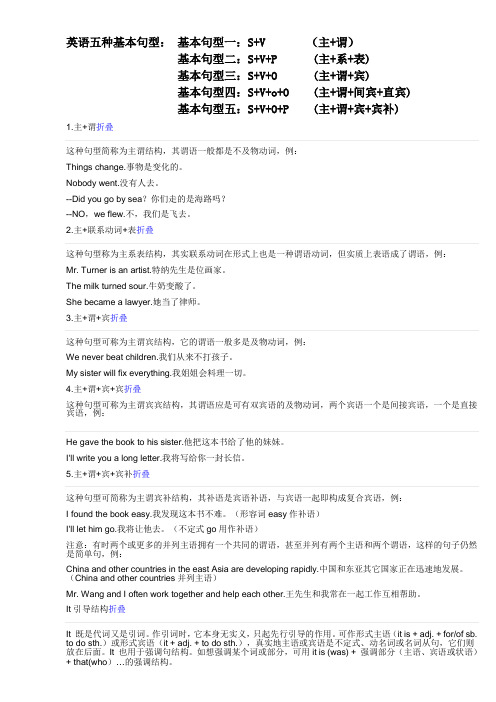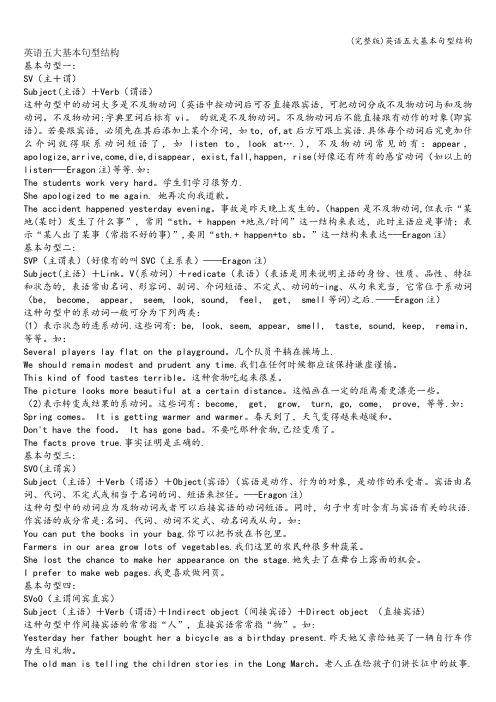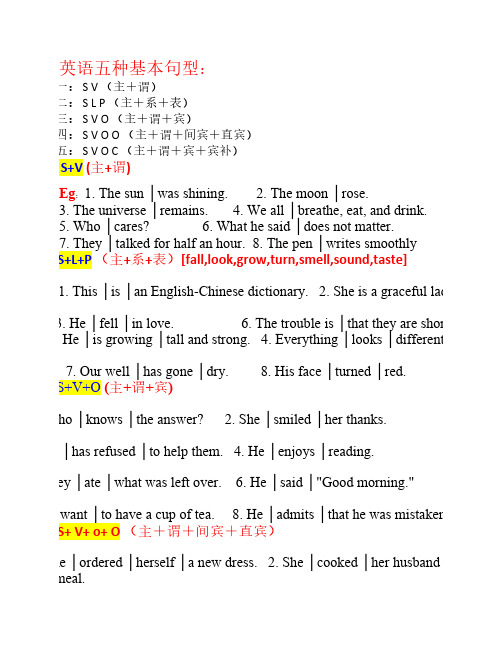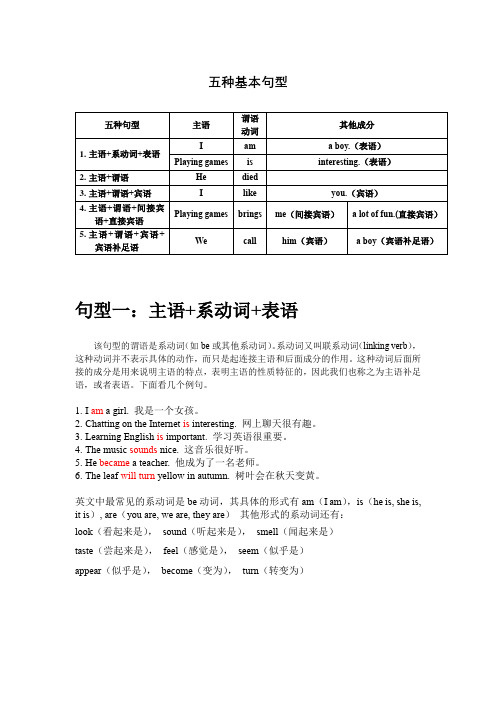英语五种基本句型
英语五种基本句型

英语五种基本句型:基本句型一:S+V (主+谓)基本句型二:S+V+P (主+系+表)基本句型三:S+V+O (主+谓+宾)基本句型四:S+V+o+O (主+谓+间宾+直宾)基本句型五:S+V+O+P (主+谓+宾+宾补)这种句型简称为主谓结构,其谓语一般都是不及物动词,例:Things change.事物是变化的。
Nobody went.没有人去。
--Did you go by sea?你们走的是海路吗?--NO,we flew.不,我们是飞去。
这种句型称为主系表结构,其实联系动词在形式上也是一种谓语动词,但实质上表语成了谓语,例:Mr. Turner is an artist.特纳先生是位画家。
The milk turned sour.牛奶变酸了。
She became a lawyer.她当了律师。
这种句型可称为主谓宾结构,它的谓语一般多是及物动词,例:We never beat children.我们从来不打孩子。
My sister will fix everything.我姐姐会料理一切。
4.主+谓+宾+宾折叠这种句型可称为主谓宾宾结构,其谓语应是可有双宾语的及物动词,两个宾语一个是间接宾语,一个是直接宾语,例:He gave the book to his sister.他把这本书给了他的妹妹。
I'll write you a long letter.我将写给你一封长信。
这种句型可简称为主谓宾补结构,其补语是宾语补语,与宾语一起即构成复合宾语,例:I found the book easy.我发现这本书不难。
(形容词easy作补语)I'll let him go.我将让他去。
(不定式go用作补语)注意:有时两个或更多的并列主语拥有一个共同的谓语,甚至并列有两个主语和两个谓语,这样的句子仍然是简单句,例:China and other countries in the east Asia are developing rapidly.中国和东亚其它国家正在迅速地发展。
英语五种基本句型

Exercise
1. He is studying. 主语 谓语 2. The teachers love us. 主语 谓语 宾语 3. You showed us your photos. 主语 谓语 间宾 直宾 will ask me to jump. 4. Tom will ask me to jump. 主语 谓语 宾语 宾补 5. They can sing well. 主语 谓语 状语
英 语 五 种 基 本 句 型
1. 主语 + 系动词 + 表语 2. 主语 + 谓语 3. 主语 + 谓语 + 宾语 4. 主语 + 谓语 + 间宾 + 直宾 5. 主语 + 谓语 + 宾语 + 宾补
五种基本句型
1. 主语 系动词 表语 (SVC) 主语+系动词 表语: 系动词+表语
He is a student. His face turned red. The apple tastes sweet. The soldier keeps still.
分 析 句 子 结 构
1. His father is a good cook.
主系表
2. She is watering the flowers. 主谓宾 3. You can sing and dance. 主谓 4. We will buy him a book. 5. These books are good. 6. Jack wants me to dance. 7. She has an old car. 8. It’s my duty to help you. 主谓双宾 主系表 主谓宾宾 主谓宾 主系表
(完整版)英语五大基本句型结构

英语五大基本句型结构基本句型一:SV(主+谓)Subject(主语)+Verb(谓语)这种句型中的动词大多是不及物动词(英语中按动词后可否直接跟宾语,可把动词分成不及物动词与和及物动词。
不及物动词:字典里词后标有vi。
的就是不及物动词。
不及物动词后不能直接跟有动作的对象(即宾语)。
若要跟宾语,必须先在其后添加上某个介词,如to,of,at后方可跟上宾语.具体每个动词后究竟加什么介词就得联系动词短语了,如listen to,look at….),不及物动词常见的有:appear,apologize,arrive,come,die,disappear,exist,fall,happen,rise(好像还有所有的感官动词(如以上的listen-—Eragon注)等等.如:The students work very hard。
学生们学习很努力.She apologized to me again. 她再次向我道歉。
The accident happened yesterday evening。
事故是昨天晚上发生的。
(happen是不及物动词,但表示“某地(某时)发生了什么事”,常用“sth。
+ happen +地点/时间”这一结构来表达,此时主语应是事情;表示“某人出了某事(常指不好的事)”,要用“sth.+ happen+to sb。
”这一结构来表达-—Eragon注)基本句型二:SVP(主谓表)(好像有的叫SVC(主系表)——Eragon注)Subject(主语)+Link。
V(系动词)+redicate(表语)(表语是用来说明主语的身份、性质、品性、特征和状态的,表语常由名词、形容词、副词、介词短语、不定式、动词的-ing、从句来充当,它常位于系动词(be, become, appear, seem, look, sound, feel, get, smell等词)之后.——Eragon注)这种句型中的系动词一般可分为下列两类:(1)表示状态的连系动词.这些词有:be, look, seem, appear, smell, taste, sound, keep, remain,等等。
英语五种基本句型

英语五种基本句型:基本句型一: S V (主+谓)基本句型二: S L P (主+系+表)基本句型三: S V O (主+谓+宾)基本句型四: S V O O (主+谓+间宾+直宾)基本句型五: S V O C (主+谓+宾+宾补)句型一: S+V (主+谓)Eg:1. The sun │was shining. 2. The moon │rose.3. The universe │remains.4. We all │breathe, eat, and drink.5. Who │cares?6. What he said │does not matter.7. They │talked for half an hour. 8. The pen │writes smoothly句型二:S+L+P (主+系+表)[fall,look,grow,turn,smell,sound,taste]1. This │is │an English-Chinese dictionary.2. She is a graceful lady.3. He │fell │in love. 6. The trouble is │that they are short of money5. He │is growing │tall and strong. 4. Everything │looks │different.7. Our well │has gone │dry. 8. His face │turned │red.句型三:S+V+O (主+谓+宾)1. Who │knows │the answer?2. She │smiled │her thanks.3. He │has refused │to help them.4. He │enjoys │reading.5. They │ate │what was left over.6. He │said │"Good morning."7. I │want │to have a cup of tea. 8. He │admits │that he was mistaken.句型四:S+ V+ o+ O (主+谓+间宾+直宾)1. She │ordered │herself │a new dress.2. She │cooked │her husband │a delicious meal.3. He │brought │you │a dictionary.4. He │denies │her│nothing.5. I │showed │him │my pictures.6. I │gave │my car │awash.7. I │told │him │that the bus was late. 8. He │showed │me│how to run the machine.句型五:S V O C (主+谓+宾+宾补)Eg: 1. They │appointed │him │manager. 2. They │painted│the door │green.3. This │set │them │thinking.4. They │found │the house│deserted.5. What │makes │him │think so?6. We │saw │him │out.7. He │asked │me │to come back soon. 8. I │saw │them│getting on the bus.:句型(一)主语+不及物动词 ( S + V ) :1. 他昨天早上起床很晚。
英语五种基本句型

五种基本句型句型一:主语+系动词+表语该句型的谓语是系动词(如be或其他系动词)。
系动词又叫联系动词(linking verb),这种动词并不表示具体的动作,而只是起连接主语和后面成分的作用。
这种动词后面所接的成分是用来说明主语的特点,表明主语的性质特征的,因此我们也称之为主语补足语,或者表语。
下面看几个例句。
1.I am a girl. 我是一个女孩。
2.Chatting on the Internet is interesting. 网上聊天很有趣。
3.Learning English is important. 学习英语很重要。
4.The music sounds nice. 这音乐很好听。
5.He became a teacher. 他成为了一名老师。
6.The leaf will turn yellow in autumn. 树叶会在秋天变黄。
英文中最常见的系动词是be动词,其具体的形式有am(I am),is(he is, she is, it is), are(you are, we are, they are)其他形式的系动词还有:look(看起来是),sound(听起来是),smell(闻起来是)taste(尝起来是),feel(感觉是),seem(似乎是)appear(似乎是),become(变为),turn(转变为)句型二:主语+谓语该句型的谓语动词是不及物动词(intransitive verb),所表示的动作没有作用对象,其本身的意思完整,所以其后不需要带宾语。
下面看几个例子:1.He died. 他死了。
(解析:死(die)这个动作就是主语自主的完成的,并没有作用对象,所以die 这个不及物动词后不能再接宾语了。
)2.These children are playing. 这些孩子们正在玩耍。
(解析:该句的play本身已经表达了完整的意思,没有作用的对象,这句话并不需要告诉我们孩子们在玩什么。
五种基本句型

五种基本句型高一英语五种基本句型1、主语+ 系动词+ 表语2、主语+ 不及物动词3、主语+ 及物动词+ 宾语4、主语+ 及物动词+ 间接宾语+ 直接宾语5、主语+ 及物动词+ 宾语+ 宾语补足语主语+ 系动词+ 表语1. Jack is a good boy.2. The park looks beautiful in spring.3. His leg got hurt just now.4. Please keep silent!5. Tom will become a doctor next year.主语+ 不及物动词1. My grandma is sleeping now.2. I will stay in Shanghai for a week.3. Jack is leaving for New York.4. It rained hard last night.5. Lucy arrived in Beijing yesterday.主语+ 及物动词+ 宾语1. My sister is writing a letter at this moment.2. Jack enjoys collecting stamps.3. Our teacher promised to see themovie with us.4. I d on’t know which school he is in.主语+ 及物动词+间接宾语+ 直接宾语1. His father bought him a computer.2. I sent a birthday gift to her yesterday.3. My mother taught me how to do it.4. She asked Lucy whose pen it was. 主语+ 及物动词+宾语+ 宾语补足语1. We must keep the classroom clean.2. They consider Jack a brave boy.3. Let the fresh air in.4. Lucy will make herself known.5. I saw the little girl dancing.简单句的五种基本句型歌诀:英语句型万万千,五大句型把线牵;句型种类为动词,后接什么是关键;系词后面接表语,Vi.独身无牵连;Vt.又可分三类,单宾双宾最常见,还有宾语补足语,各类搭配记心间。
五大英语基本句型
英语语法五大基本句型英语句子是由主语(subject), 谓语动词(verb),宾语(object), 表语(predicative),状语(adverbial),宾语补足语(object complement)等成分组成,按照这些成分的组合方式英语句子可分为五种基本句型。
S:Subject(主语)V:Verb(动词)O:Object(宾语)IO:Indirect Object(间接宾语)DO:Direct Object(直接宾语)P:Predictive(表语)OC: Object Complement(宾语补足语)1句型一:S+V 主语+不及物动词不及物动词本身就可以表达完整的意念,不需要宾语及补语,但有时可有副词,介词短语等状语修饰语。
e.g. The rain stopped .The old man walks in the park .句型一的扩展:1.主语+不及物动词+状语e.g. The machine works smoothly. (机器运转正常。
)2.There +不及物动词+主语e.g. There is some milk in the bottle .There comes the bus .3. 主语+不及物动词+ 动词不定式e.g. They stopped to take a short rest . (他们停下来稍作休息) 注意动词stop 可用作不及物动词,也可用作及物动词。
作不及物动词时, 通常后接动词不定式,表示停下来的目的是做另一件事。
作及物动词时,通常后接动名词,表示停止做这件事。
e.g. They stopped taking a rest .2句型二:S+V+P 主语+系动词+表语系动词本身不能表达完整的意念没,需要形容词,名词,介词短语等来补充说明主语,也叫主语补语。
e.g. My sister is a nurse .I feel quite hungry .The ball is under the desk .3句型三:S+V+O 主语+及物动词+宾语及物动词本身需要一个动作的接受者(宾语),才可以表达一个完整的意念。
英语的五种基本句型
英语的五种基本句型1. Subject (主语) +Verb (谓语)这种句型中的动词大多是不及物动词,这些动词常见的有:appear, apologize,arrive, come, die, disappear, exist, fall, happen, rise,等等。
如:The students work very hard.学生们学习很努力。
She apologized to me again. 她再次向我道歉。
The accident happened yesterday evening.事故是昨天晚上发生的。
2. Subject (主语) +Link. V(系动词) +Predicate(表语)这种句型中的系动词一般可分为下列两类:(1)表示状态的连系动词。
这些词有:be, look, seem, appear, smell, taste, sound, keep, remain, 等等。
如:Several players lay flat on the playground.几个队员平躺在操场上。
We should remain modest and prudent any time.我们在任何时候都应该保持谦虚谨慎。
This kind of food tastes terrible.这种食物吃起来很糟糕。
The picture looks more beautiful at a certain distance.这幅画在一定的距离看更漂亮一些。
(2)表示转变或结果的系动词。
这些词有:become, get, grow, turn, go, come, prove,等等。
如:Spring comes. It is getting warmer and warmer.春天到了,天气变得越来越暖和。
Don't have the food. It has gone bad.不要吃那种食物,已经变质了。
英语五种基本句型
10. I’m looking forward to meeting you soon.
基本句型四: 主+谓(及物)+双宾(间 宾+直宾)
此句型的句子有一个共同特点:谓语动词 必须跟有两个宾语才能表达完整的意思. 这两个宾语一个是动作的直接承受者,另 一个是动作的间接承受者.通常这一间接 承受者用一个介词来连接,当动作的间接 承受者在动作的直接承受者之前时,这一 介词往往被省略.
英语五种基本句型
基本句型一: 主+系+表
此句型的句子有一个共同的特点:句子谓语动词 都不能表达一个完整的意思,必须加上一个表明 主语身份或状态的表语构成复合谓语,才能表达 完整的意思.这类动词叫做连系动词.系动词分 两类:be, look, keep, seem等属一类;get, grow, become, turn等属另一类,表示变化.be 本身没有什么意义,只起连系主语和表语的作用. 其它系动词仍保持其部分词义.
8. It is getting darker and darker.
9. 这食物吃起来挺可口的。 9. The food tastes delicious. 10. 这故事听起来很有趣。 10. The story sounds very interesting.
基本句型二: 主+谓(不及物动词)
2. 我们正在使我们的国家变得越来越美丽。
2. We are making our country more and more beautiful.
3. 当我到达教室时,我发现里边没有人。
3. When I got to the classroom, I found nobody in.
英语五种基本句型整理归纳
英语五种基本句型整理归纳正确的英语句子都要符合一定的语法结构要求。
英语句子的结构可以归纳成五种基本句型。
英语句子都可以看作是这五种句型及其扩大、组合、省略或倒装构成的。
下面给大家带来一些关于英语五种基本句型整理归纳,希望对大家有所帮助。
一.主语谓语用符号表示为:① SV(主+谓)② SVO(主+谓+宾) ③ SVoO(主+谓+间宾+直宾)④ SVOC(主+谓+宾+宾补)⑤ SVP(主+系+表)主语(subject)谓语(predicate)宾语(object)定语(attribute)状语(adverbial)补语(complement)表语(predicative)1. 基本句型一:SV(主+谓)这类句子的谓语动词都是不及物动词,都不带宾语,但可以带状语。
2. 基本句型三:SVO(主+谓+宾)此结构是由“主语+及物动词(词组)+宾语”构成。
3. 基本句型四:SVoO(主+谓+间宾 +直宾)有些及物动词可以有两个宾语,如:give“给”,pass“递”,bring“带”,show“展示”。
这两个宾语通常一个指人,为间接宾语;一个指物,为直接宾语。
间接宾语一般位于直接宾语之前。
若直接宾语为人称代词,通常不能放在后面;间接宾语放后面时前面要加to的动词;间接宾语放后面时前面要加for的动词;一般用to多些,用for的记住常用的三个就行;4. 基本句型五:SVOC(主+谓+宾+宾补)有些动词虽然是及物动词,但是只跟一个宾语还不能表达完整的意思,宾语后必须加上一个补充成分才能使意思完整。
所加的成分就是宾语补足语。
宾语和宾语补足语构成逻辑上的主谓关系,它们一起构成复合宾语。
基本句型二:SVP(主+系+表)系动词主要是be;但还有一些实义动词候有时候也可作系动词,这类系动词有人称之为半系动词。
A. 如何辨别系动词有些动词既可作连系动词,又可以作实义动词。
如何来辨别呢?有一个最简便的方法,即用连系动词be替换句子中的这些动词,句子仍然成立且句意变化不大就是连系动词;反之,不能替换的,就是实义动词。
- 1、下载文档前请自行甄别文档内容的完整性,平台不提供额外的编辑、内容补充、找答案等附加服务。
- 2、"仅部分预览"的文档,不可在线预览部分如存在完整性等问题,可反馈申请退款(可完整预览的文档不适用该条件!)。
- 3、如文档侵犯您的权益,请联系客服反馈,我们会尽快为您处理(人工客服工作时间:9:00-18:30)。
英语五种基本句型结构
发表时间:2010-11-30 19:51:36作者:钟超韫来源:
英语中的五种基本句型结构
一、句型1:Subject (主语) +Verb (谓语)
这种句型中的动词大多是不及物动词,所谓不及物动词,就是这种动词后不可以直接接宾语。
常见的动词如:work, sing, swim, fish, jump, arrive, come, die, disappear, cry, happen等。
如:
1) Li Ming works very hard.李明学习很努力。
2) The accident happened yesterday afternoon.事故是昨天下午发生的。
3)Spring is coming.
4) We have lived in the city for ten years.
二、句型2:Subject (主语) +Link. V(系动词) +Predicate(表语)
这种句型主要用来表示主语的特点、身份等。
其系动词一般可分为下列两类:
(1)表示状态。
这样的词有:be, look, seem, smell, taste, sound, keep等。
如:
1) This kind of food tastes delicious.这种食物吃起来很可口。
2) He looked worried just now.刚才他看上去有些焦急。
(2)表示变化。
这类系动词有:become, turn, get, grow, go等。
如:
1) Spring comes. It is getting warmer and warmer.春天到了,天气变得越来越暖和。
2) The tree has grown much taller than before.这棵树比以前长得高多了。
三、句型3:Subject(主语) +Verb (谓语) +Object (宾语)
这种句型中的动词一般为及物动词, 所谓及物动词,就是这种动词后可以直接接宾语,其宾语通常由名词、代词、动词不定式、动名词或从句等来充当。
例:
1) He took his bag and left.(名词)他拿着书包离开了。
2) Li Lei always helps me when I have difficulties. (代词)当我遇到困难时,李雷总能给我帮助。
3) She plans to travel in the coming May Day.(不定式)她打算在即将到来的“五一”外出旅游。
4) I don’t know what I should do next. (从句)我不知道下一步该干什么。
注意:英语中的许多动词既是及物动词,又是不及物动词。
四、句型4:Subject(主语)+Verb(谓语)+Indirect object(间接宾语)+Direct object (直接宾语)
这种句型中,直接宾语为主要宾语,表示动作是对谁做的或为谁做的,在句中不可或缺,常常由表示“物”的名词来充当;间接宾语也被称之为第二宾语,去掉之后,对整个句子的影响不大,多由指“人”的名词或代词承担。
引导这类双宾语的常见动词有:buy, pass, lend, give, tell, teach, show, bring, send等。
如:
1) Her father bought her a dictionary as a birthday present.她爸爸给她买了一本词典作为生日礼物。
2)The old man always tells the children stories about the heroes in the Long March.老人经常给孩子们讲述长征途中那些英雄的故事。
上述句子还可以表达为:
1)Her father bought a dictionary for her as a birthday present.
2)The old man always tells stories about the heroes to the children in the Long March.
五、句型5:Subject(主语)+Verb (动词)+Object (宾语)+Complement(补语)
这种句型中的“宾语+补语”统称为“复合宾语”。
宾语补足语的主要作用或者是补充、说明宾语的特点、身份等;或者表示让宾语去完成的动作等。
担任补语的常常是名词、形容词、副词、介词短语、分词、动词不定式等。
如:
1)You should keep the room clean and tidy. 你应该让屋子保持干净整洁。
(形容词)
2) We made him our monitor.(名词)我们选他当班长。
3) His father told him not to play in the street.(不定式)他父亲告诉他不要在街上玩。
4)My father likes to watch the boys playing basketball.(现在分词)
5) Yesterday I had a picture taken with two Americans.(过去分词)
●常见的动词有: tell, ask, advise, help, want, would like, order, force, allow等。
●注意:动词have, make, let, see, hear, notice, feel, watch等后面所接的动词不定式作宾补时,不带to。
如:
1) The boss made him do the work all day.老板让他整天做那项工作。
2) I heard her sing in the next room all the time last night.昨天晚上我听见她在隔壁唱了一个晚上。
